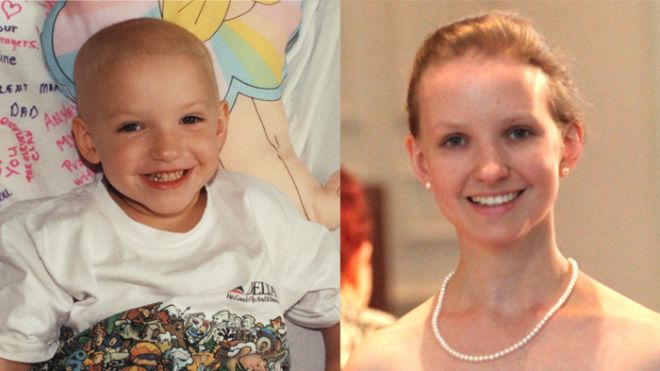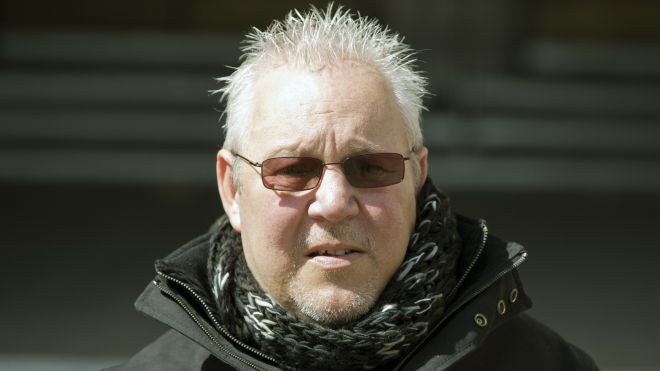
Ansley Riedel was just 10 months old when she was diagnosed with acute myeloid leukemia (AML) – a cancer of the blood and bone marrow. She immediately began radiation and chemotherapy, undergoing treatment up until she was a little older than 3-and-a-half years old.  Then, after receiving a second bone marrow transplant from her 4-month-old baby brother in July of 1991, Riedel reached the goal that every cancer patient hopes to achieve: Remission. “We celebrate what we call my second birthday,” Riedel told FoxNews.com, regarding the special occasion. Nearly 21 years later, Riedel is doing better than ever – but she hasn’t forgotten her time spent in the hospital so many years ago.  Though she was only a toddler at the time, her bout with cancer ultimately inspired her to become a nurse in order to help others like herself. “I remember a lot of the clinic visits – the routine of going to the clinic, getting labs, some of my hospital stays,” Riedel said. “I remember my nurses a lot, which is why I chose to become a nurse.  They were really like my first group of friends that I got to know really well.” While Riedel was ultimately able to turn her cancer into a source of inspiration, post-cancer life has still had its fair share of difficulties. The radiation treatment Riedel underwent at such a young age has had a lasting impact on her health. Between the ages of 10 and 14, Riedel had to receive daily shots of growth hormone because her development had been stunted by treatment.  She also takes a daily medication for low thyroid function – something her doctors speculate may have been affected by radiation. “There’s a lot of unknown because I was so young,” Riedel said. “I have to be pretty careful with my teeth.  The radiation kind of damaged my permanent teeth, so I’m more susceptible to cavities.  I see more of a specialist for my regular cleanings. My roots were damaged and I couldn’t have braces because of that.” The health setbacks Riedel has had to face are not uncommon for cancer survivors.  While radiation and chemotherapy are meant to kill fast-growing cancer cells, they can also damage healthy cells in the heart, kidneys, lungs and more in the process. “Obvious problems cancer survivors have are endocrine (issues), growth hormone deficiency, low thyroid, problems beginning puberty and fertility,” Dr. Lillian Meacham, a pediatric endocrinologist and director of the Cancer Survivor Program at the Aflac Cancer Center in Atlanta, told FoxNews.com.  “They can have…problems related to scarring of the lungs or damage to the heart muscle.  We have to be vigilant about almost every organ to be sure that we are looking out for these problems, mainly because we want to preserve quality of life and decrease health care costs.” For children diagnosed in the 1960s with acute lymphoblastic leukemia, which is the most common form of childhood cancer, the chance of survival was only 10 percent. Fortunately, chances of survival have increased to 80 percent today. Therefore, finding ways to help cancer survivors maintain a healthy lifestyle post-cancer is an ever increasing necessity. To address this need, Meachem and others at the Aflac Cancer Center have created SurvivorLink, an online tool that aims to improve cancer survivors’ quality of life.  According to its website, SurvivorLink hopes to increase awareness about the long-term health needs of child cancer survivors, as well as create a patient portal, which will provide patients with easy access to all their relevant health information. “When kids come to the survivor clinic, we give them a Survivor Health Care Plan – which details what they need throughout their lives to stay healthy,” Meachem said. “They can upload that into this website, so let’s say they move to North Carolina or Montana, they can share their documents to new health care providers.  It’s like having an electronic chart they carry with them at all times.” Riedel is currently in the process of filling out her patient profile on SurvivorLink, and she said she likes how it is specifically tailored to her own personal needs. “One of the good things about SurvivorLink is it’s based on your diagnosis and based on your protocol.  Depending on how much chemo you had, it will tell you specifically that for this one chemo, these are the big side effects and long term things that can result.” As someone who is still actively involved in health care, Riedel is very passionate about increasing knowledge and communication among cancer survivors and their health care providers.  For her, easy access to information is essential for a long and healthy life. “The main message is just to get informed and get help if you need to – but really be an advocate for yourself,” Riedel said. “If you take care of yourself, then other people are going to be more willing to work with you.” Click for more on SurvivorLink.source : http://www.foxnews.com/health/2013/06/05/survivorlink-online-tool-helps-child-cancer-survivors-maintain-healthy-life/

